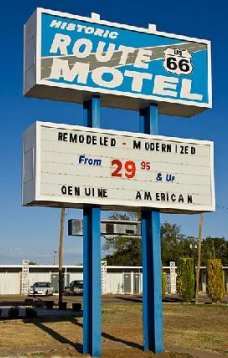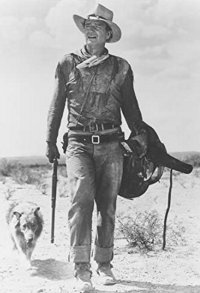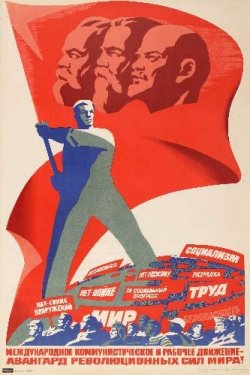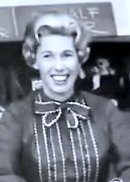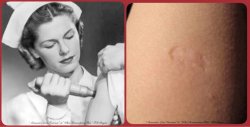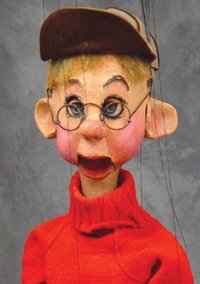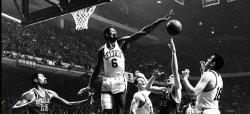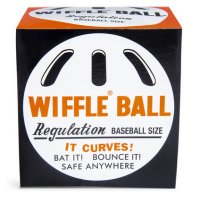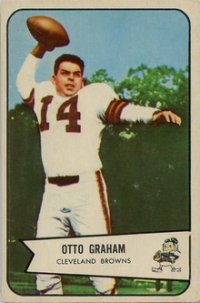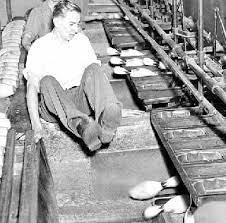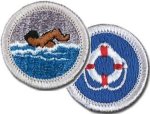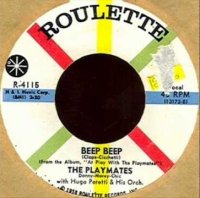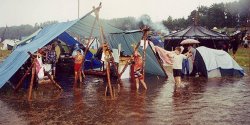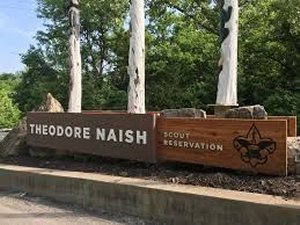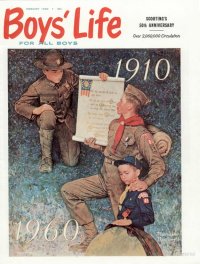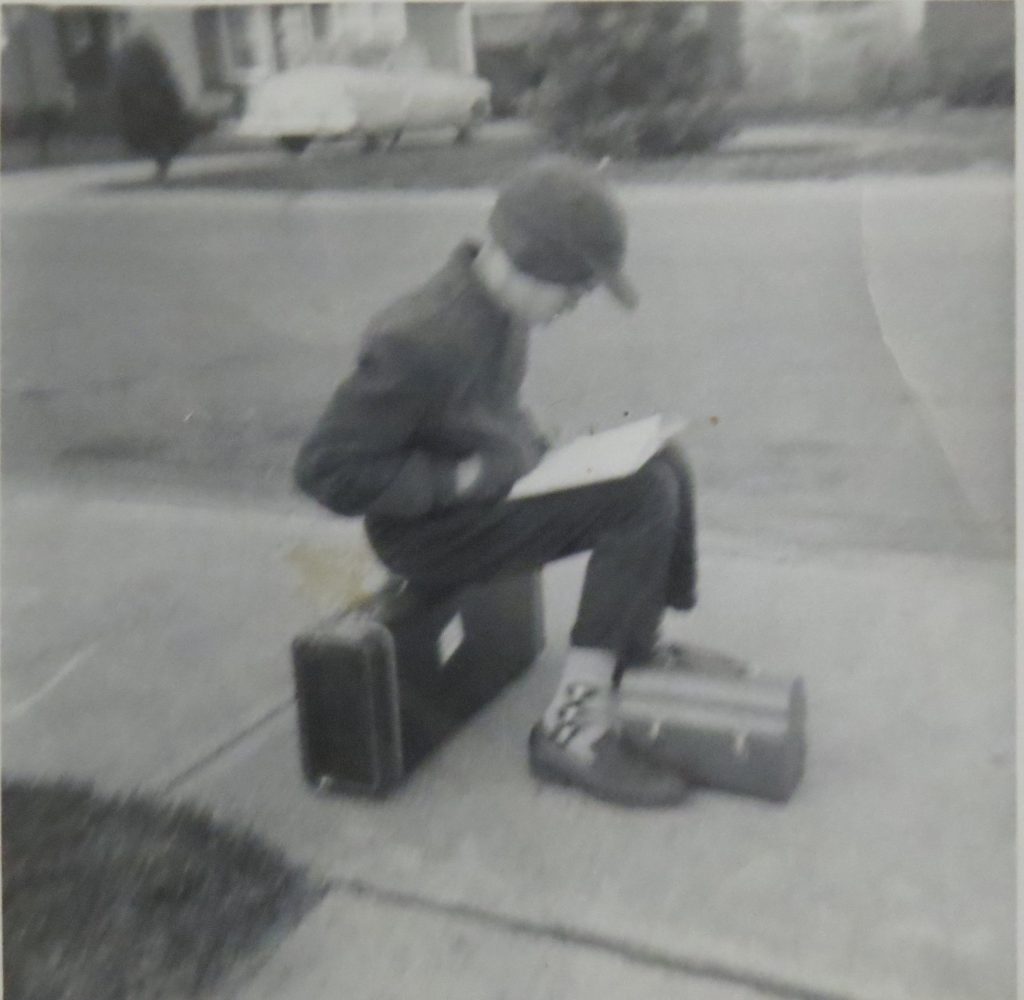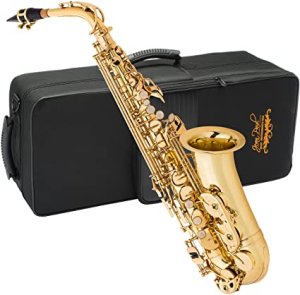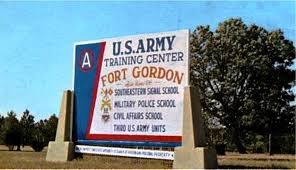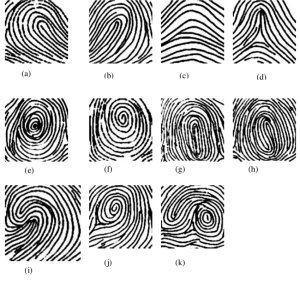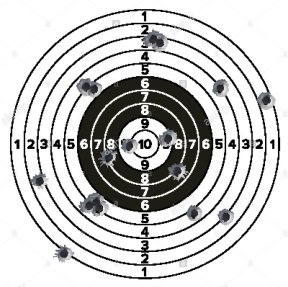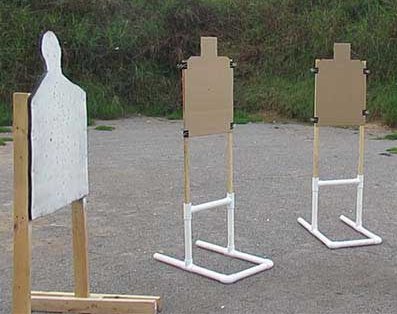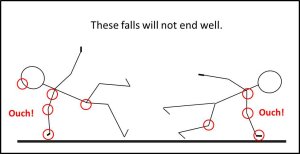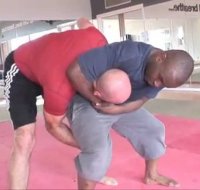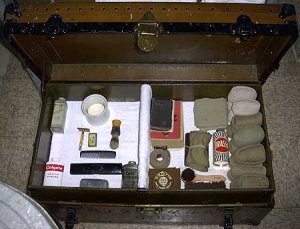The top secret base that welcomed the public. Continue reading
The army allowed us a few days before to transit from Fort Gordon to Sandia Base (SBNM) in Albuquerque. I flew from Augusta to KC and stayed at my parents’ house in Leawood, KS. At the time my sister Jamie was a freshman at Bishop Miege High School. I cannot remember anything that we did. I remember that a photo was taken of me and my dad standing on the patio in back of the house. It is probably in a bag or a box somewhere in our house in Enfield, CT, but I have not seen it in years.
Bob Willems drove his Volkswagen from his house in New Jersey to our house and stayed overnight with us. The next morning we began the 780 mile journey to Albuquerque. Riding with Bob was a big advantage for me. I could easily bring a lot more stuff than I could take on an airplane. I loaded my golf clubs, my set of posters, my stereo with the AR speakers, all of my record albums, and some books.
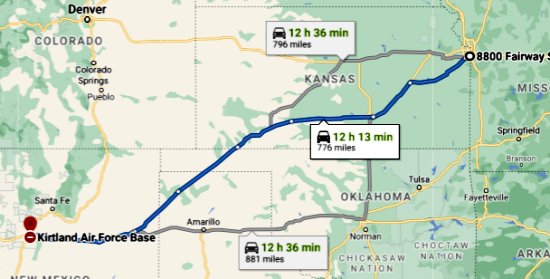 Bob did all the driving. Since we were required to report on the day after the morning that we left, we were in no great hurry. Nevertheless, we never considered taking the scenic route down from Colorado Springs to Albuquerque. The route we took offered no scenery to speak of. We took I-35 south to Oklahoma City and then I-40 west to Albuquerque. On the drive through Kansas we saw virtually nothing but farms on both sides of the road. Oklahoma was similar, but there were more oil “crickets”. New Mexico was mostly the parched landscape shown in cowboy movies. At least 90 percent of the drive on I-40 was uphill, not steep, but steady. At times Bob’s car seemed to be struggling.
Bob did all the driving. Since we were required to report on the day after the morning that we left, we were in no great hurry. Nevertheless, we never considered taking the scenic route down from Colorado Springs to Albuquerque. The route we took offered no scenery to speak of. We took I-35 south to Oklahoma City and then I-40 west to Albuquerque. On the drive through Kansas we saw virtually nothing but farms on both sides of the road. Oklahoma was similar, but there were more oil “crickets”. New Mexico was mostly the parched landscape shown in cowboy movies. At least 90 percent of the drive on I-40 was uphill, not steep, but steady. At times Bob’s car seemed to be struggling.
We had a lot of time to converse in the car, but I cannot remember that we conclusively addressed any of the pressing issues of the day. We knew almost nothing about Sandia Base, and so we did not know what to expect when we got there. There was no Internet, of course, and so we had no way to get much information about it in the few days allowed for travel.
Perhaps we should have been alerted by the word “Base”. Most US Army installations are called forts or, less commonly, camps. The other clue was that our orders told us to report to “the MP Company”. Usually a military company is designated with a number as well as a number for the brigade and battalion. Neither the brigade nor the battalion was specified in the orders.
 In point of fact, SBNM was not an army base. We later learned that it was run by a separate organization called the Defense Nuclear Agency (DNA). It was part of a large military complex that occupied the southeast corner of Albuquerque. Situated between SBNM and the Sunport, Albuquerque’s airport, was Kirtland Air Force Base. Kirtland had everything one would expect in an Air Force base, including runways. No one talked much about the other base, Manzano. It was in the southeast corner, and very secret stuff reportedly transpired there. Policing and a few other things at SBNM were assigned to the Army. The Navy and Air Force had their own assignments.
In point of fact, SBNM was not an army base. We later learned that it was run by a separate organization called the Defense Nuclear Agency (DNA). It was part of a large military complex that occupied the southeast corner of Albuquerque. Situated between SBNM and the Sunport, Albuquerque’s airport, was Kirtland Air Force Base. Kirtland had everything one would expect in an Air Force base, including runways. No one talked much about the other base, Manzano. It was in the southeast corner, and very secret stuff reportedly transpired there. Policing and a few other things at SBNM were assigned to the Army. The Navy and Air Force had their own assignments.
We decided to stop for the night at a ma-and-pa motel on Route 66 in Tucumcari, NM, 234 miles east of the base. At one time Tucumcari was rather famous for its motels. When I googled the town in 2020, it still showed a motel sign as the image for the town. We found one that neither of us could believe. We were smart or lucky enough to make our way from the interstate to Route 66. It was lined on both sides with motels with “Vacancy” signs. We picked one of them more or less at random. My recollection is that we only paid $6 to stay the night. They gave us a suite of two rooms with a bathroom that was accessible from both rooms. In the morning they brought a newspaper, coffee, and donuts. What an enchanting welcome to the Land of Enchantment!
The drive to Albuquerque was a little tense. We did not know what to expect. The city lies at the foot of the Sandia Mountains. Its elevation is 5,312 feet, a little higher than Denver. Sandia Peak, 10,679 feet, is just off to the northeast. You never lose your bearings in Albuquerque. If you feel disoriented, just look for Sandia Peak. It is almost always visible. Clouds are rare in New Mexico.
We found our way to the base’s main gate on Wyoming St., which is one of Albuquerque’s principal north-south arteries. I had assumed that SBNM would be a little way out of town. It was not. Residential Albuquerque was right outside the gate. Furthermore the soldier standing guard on the gate, who was wearing an MP arm band, just waved us—and everyone else—through.
Bob parked his car somewhere, and we made our way to the MP Company, where we were warmly welcomed. We learned that the company was horribly understaffed. We were the first group of new people that had arrived there in many months. The guys in some platoons were not allowed to take days off. If anyone got sick or injured, they had big problems. Fortunately a fairly large number of new people arrived within the next few weeks.
Four platoons did all the police work in shifts. A platoon worked the day shift (6:00AM-2:00PM) for three days, then the swing shift (2:00-10:00PM) for three days, then the midnight shift (“mids”: 10:00PM-6:00AM for three days), then three days off. There was also a traffic platoon, a headquarters platoon, and a platoon for guys with special assignments such as security escorts.
Al Williams, who had driven down from Boston in his Toyota, and I were assigned to the second platoon under Sgt. Glenn. Bob and Dave Zimmerman went to other platoons; I don’t remember which ones. In some ways Ned Wilson got the best deal of all. He was assigned to traffic duty, which meant that he worked only in the daytime and had weekends off. He lived with his wife in an apartment that was near the base.
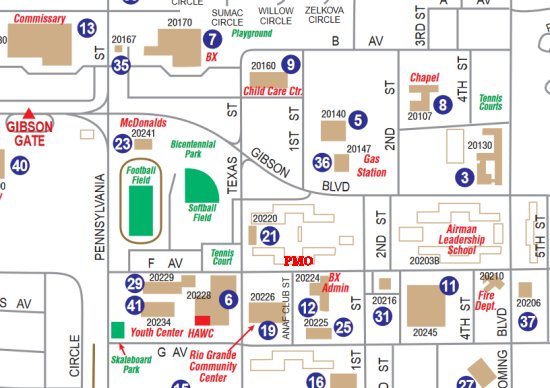
The above image is the part of the former Sandia Base that functioned as a town center. I labeled the old MP building in area #21 with “PMO”. I lived in the west wing of that building and worked in the Provost Marshall’s Office in the center. The similarly shaped building across the courtyard and the tan building on Texas St, were not there in my day, but a much smaller library was. I think that the MP building and the similar building across the courtyard are now dormitories. The Air Force moved the police headquarters to the building labeled #11.
The library was a stone’s throw away. Within a few blocks were the mess hall, the commissary (grocery store), BX (department store), a small gym with all kinds of sporting equipment, the ANAF club for enlisted men and women (weekly bridge games), and a bowling alley. When we arrived a nine-hole golf course far to the south had just been completed well to the south.
I was astounded to learn that the largest buildings on the base belonged to a private company, Sandia Laboratories. They still do. Its facilities are a few blocks southeast of the above map. Everything done on the base was top secret, and so I may still be prohibited from revealing what they did there. I am allowed to tell you that the building in front of the Sandia Labs complex had a big sign on it that said, “Nuclear Weapons School”. Also, of course, all of the military personnel wore a Defense Nuclear Agency patch on their sleeves.
I did not expect the base to have so many permanent residents. Surrounding the business area depicted above were three nice residential areas. Most of the inhabitants were families of retired military personnel. Few were senior citizens; you could retire from the military after twenty years. So, nearly all of these people were under sixty. There were a lot of children. It felt like a suburb in which Beaver Cleaver would be comfortable.
The base itself was huge. It occupied 47,000 acres, which was over 73 square miles, over 39 percent of the total land area in Albuquerque. This did not include the 3,000 acres each contained by Kirtland AFB and Manzano base. Most of SBNM was several miles south of where we entered and consisted of undeveloped desert.
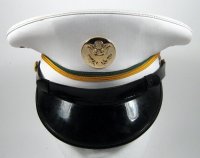 At some point we were also provided with MP arm bands and patches for our uniforms with the DNA symbol on it. They also gave us a little card with the ten series used on the police radio transmissions at SBNM, a nightstick, a holster with places for both a .45 caliber pistol and the stick, and a white MP hat.
At some point we were also provided with MP arm bands and patches for our uniforms with the DNA symbol on it. They also gave us a little card with the ten series used on the police radio transmissions at SBNM, a nightstick, a holster with places for both a .45 caliber pistol and the stick, and a white MP hat.
Someone escorted me to my room, which was in the middle of the south side of the first floor on the west wing of the MP Company barracks. From the outside it looked flat, but there were two or three steps to the left of my door. I could hardly believe it. I had a room to myself. The door could even be locked! There was a dresser, a closet, a couple of chairs, a desk, and a bed. It was even air conditioned. By army standards of the sixties it was luxurious.
Everyone who lived on our floor was in the second platoon. When our group moved in there were quite a few empty rooms.
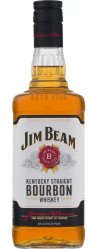 The first night in my room was memorable. About 2:00 in the morning I heard a pounding on my door. I stumbled over to the door. Two guys were there. One, a guy from another platoon named Grandmaison, brought a bottle of Kentucky bourbon. They both had already obviously consumed quite a bit of it. They demanded that I take a couple of tugs on the bottle with them. I had never tasted bourbon before, but I was a little afraid to turn down their offer. They let me go back to sleep a few minutes later. I think that they stopped at Al’s room next.
The first night in my room was memorable. About 2:00 in the morning I heard a pounding on my door. I stumbled over to the door. Two guys were there. One, a guy from another platoon named Grandmaison, brought a bottle of Kentucky bourbon. They both had already obviously consumed quite a bit of it. They demanded that I take a couple of tugs on the bottle with them. I had never tasted bourbon before, but I was a little afraid to turn down their offer. They let me go back to sleep a few minutes later. I think that they stopped at Al’s room next.
Al and were I scheduled for duty on the midnight shift the next day. There was no orientation, no handbook, and no training. Before going on duty we had to report to the armorer to check out weapons. We each got one Colt .45 model 1911 and one clip with six bullets. If we faced seven or more bad guys, we would need to depend on the nightstick.
During the first night I was stationed at the main gate on Wyoming St. My instructions were to wave everyone through. That’s right; in those days Sandia Base was a top secret security base that was almost always open to the public twenty-four hours a day. My instructions had three other components: 1) If an officer in uniform was driving, I was required to turn the wave into a salute. 2) We were supposed to write down license numbers in a log. The guy who drove me out to the gate told me not to worry about it. If I missed one, I should just make up a license number. 3) For other issues I could call the police desk from a phone in the booth.
I guess that I should mention that the gate could be closed and locked. Someone would call to tell the guard to begin that process, which required about ten minutes. Such a call only occurred a couple of times in the ten months that I was at SBNM.
Gate duty on the midnight shift was extremely boring. Cars were few and far between. The only diversion was the police radio. I had only been there for a few minutes when the man at the police desk, Sgt. Lorenzo Bailey, ordered Al and his partner to deal with a domestic dispute. This had a big impact on me. I did not want to deal with things like domestic disputes. This was a military installation. The people who lived here were mostly lifers. Lifers love weapons. I was strongly motivated to do whatever I could to avoid going on patrol. I did not want to get shot, and I definitely was not going to shoot anyone.
At the end of the shift Al, who had stayed on patrol all night, and I walked over to the mess hall for breakfast. Because it was so early, most of the diners were from our platoon. They made omelets to order at breakfast. It was the best meal of the day. To tell the truth, the food at the mess hall was pretty good. Most guys only went out to eat when someone had a craving for Mexican food.
My first time on patrol was, I think, on a day shift with Russ Eakle. Most of the time there was not much to do on patrol. We occasionally had to escort a manager of the BX or commissary to the bank. If someone posted at a gate needed a break, one of the guys on patrol would relieve them. The challenge was to think of something to do for the rest of the time.
Russ liked to drive south into the open spaces that were still part of the base. Some horses were fenced in out there. Maybe there was a riding stable. Russ had swiped an apple or two from the mess hall to feed the horses. I just watched.
Russ fancied himself as the John Wayne type. He asked people to call him Duke. He showed me how he liked to give tickets. His specialty was citing drivers for rolling through stop signs. He showed me where he hid the truck so that he could surreptitiously catch the desperados performing these heinous acts. That first day he issued a few tickets using this technique. Then he told me that I should do the next one. I refused; he was not in my chain of command.
I asked someone, maybe Russ, about room inspections. I was told that they never inspected the bedrooms. This was music to a slob’s ears.
After a day or two I began to think about what I would buy with my first E2 paycheck: a rug for the room and a radio for when I had gate duty. The latter was not technically legal, but as long as they were not visible or audible to those driving through, no one objected.
I purchased both of these items. I think that I got the radio at the BX and the rug at a discount department store that AJ or Bob drove me to. When we were not on duty, we were on our own. We could wear civilian clothes and leave the base whenever we wanted.
Our platoon had two sergeants. The platoon sergeant’s name was Glenn, who was an E6 (staff sergeant). He basically just went through the motions, which was fine with us. The other sergeant was an E5 (plain old sergeant) whose name was Chambers or something like that. He actually supervised the units on patrol. He was both a nice guy and quite competent. He had been stationed for a while in Vietnam, but he was reluctant to talk about it. The only thing that he told us was that MPs were often used as guards for convoys. He was “short”, which meant that he would be getting out of the army1 in a few months.
 At the BX I obtained everything that I needed to decorate my room. Within the first week I put up my Russian posters on the walls of my room. The copy of Michelangelo’s centerpiece of the Sistine chapel was on the ceiling over my bed. It was the first thing that I saw when I woke up in the morning (or afternoon if we were working mids).
At the BX I obtained everything that I needed to decorate my room. Within the first week I put up my Russian posters on the walls of my room. The copy of Michelangelo’s centerpiece of the Sistine chapel was on the ceiling over my bed. It was the first thing that I saw when I woke up in the morning (or afternoon if we were working mids).
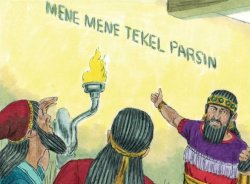 I bought some green shelving paper and cut out twenty-one letters to put on the wall. I got the idea from Chapter 5 of the book of Daniel, the proverbial writing on the wall. MENE MENE TEKEL UPHARSIN: The days of your kingdom are numbered; your leaders have been weighed and found wanting; your kingdom will be destroyed by the Medes and the Persians.
I bought some green shelving paper and cut out twenty-one letters to put on the wall. I got the idea from Chapter 5 of the book of Daniel, the proverbial writing on the wall. MENE MENE TEKEL UPHARSIN: The days of your kingdom are numbered; your leaders have been weighed and found wanting; your kingdom will be destroyed by the Medes and the Persians.
It was beginning to feel a little like home. One thing was still missing: a table for my stereo and speakers.
At some point in those first few days we met Captain Dean, the Company Commander of MPCO SBNM, and Lt. Hall, who was second in command. There must have also been a First Sergeant, but I don’t remember him. Captain Dean liked to run. He held the company record for the mile, and he was proud of it. His best time was a little over five minutes.
The captain wanted all of us to run a timed mile, and he made sure that we could all attend. We were allowed to wear sneakers and athletic gear. This was a new thing for us; in Basic and AIT we always ran in fatigues and combat boots.
Ned Wilson, Bob Willems, Dave Zimmerman, and I speculated about how much Al Williams would beat the captain’s record by. He was the state of Maine mile champion in college, and his best time was around 4:20. Captain Dean himself held the stopwatch. When he learned of Al’s prowess he was giddy with excitement.
Al ran at a pretty good clip for the first three quarters. He was on pace for a 4:40 mile, which would have been a fair result for someone who had not been able to train rigorously for four months. By then he had lapped the rest of us.
The big question was whether Al would have enough left in the tank for that last quarter-mile. Captain Dean shouted out Al’s time as he finished the third lap. Al waved to him, and then he turned around and ran the last lap backwards, which slowed him down to something close to the speed of the rest of us. As he passed them, he waved cheerfully to the lifers in attendance. Al wasn’t going to give any of them the satisfaction of thinking that he cared about this activity. It was a classy move.
1. This process is called ETS, which stands for Expiration of Term of Service. It can also be used as a verb: “He is ETSing next Thursday.”

